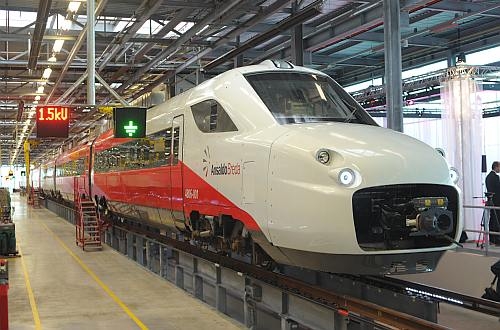The government is the only shareholder in NS and says it is convinced the train does not meet operational requirements. Infrastructure minister Mrs Wilma Mansveld stated that the government has every reason to support the conclusions and decisions of both NS and Belgian National Railways (SNCB), which has already cancelled its order for three trains.
According to Mansveld, NS has already paid AnsaldoBreda €120m but it is unclear whether it will be possible to fully recover this sum. The government says the next steps are entirely at the discretion of NS, and could include renegotiating the contract with AnsaldoBreda.
Numerous concerns have been expressed about the performance of the V250 high-speed trains, including safety-critical functions. Many are also questioning why the organisations involved in the process of granting the 'Declaration of EC conformity' and 'Authorisation to Place in Service' (art 22 and 23, European Directive 2008/57/EC concerning Interoperability) were sufficiently satisfied with the V250 to approve the trains for public use.
The roles of the national safety authority, the Dutch Environmental and Transport Inspectorate (ILT) and the notified body, Lloyds Register Rail, in this process are likely to come under scrutiny. On June 4 the Dutch government announced that the V250 contract would be the subject of a parliamentary inquiry
AnsaldoBreda has already indicated it will take legal action against SNCB and is also preparing a claim against NS. At a press conference in Naples on June 6, AnsaldoBreda CEO Mr Maurizio Manfellotto argued that the train is safe and has been certified and verified by all relevant authorities. "A high-speed project is not just about the train, it includes the rail infrastructure, signalling, and safety systems," he says. "To design a high-speed line properly it is necessary to adopt a systems integration approach, which governs all the phases of the contract, from the train design to its technical approval and commercial use. The assignment of the systems integrator function to an Irish financial services company [NS Financial Services] has delayed all of the V250 project phases, perhaps because this company was not structurally and technically qualified to do this." Manfellotto says AnsaldoBreda firmly rejects all of SNCB's allegations on project execution and claims that the railway's statements suggest the reasons for terminating contract are not technical.
The Netherlands was the first country to approve the V250 for commercial operation, completing certification on July 6 2012, three months before the trains were approved for use in Belgium. Having this Declaration of EU conformity and the Authorisation to Place in Service, AnsaldoBreda states that the train has the necessary safety case required for public service.
Meanwhile pressure is building on NS to develop a more permanent solution to cross-border services between the Netherlands and Belgium. The Dutch government has set NS a deadline of October 1 for establishing a firm alternative to the services that have been withdrawn as a result of the collapse of Fyra operations. Deputy Prime Minister Mr Lodewijk Asscher pointed out that by failing to offer an alternative, NS could be violating its concession for high-speed operations.
NS and SNCB intend to step up the frequency of the substitute conventional service from The Hague to Brussels from eight trains per day to 12 by December. There are also plans to increase Amsterdam – Brussels Thalys services from 10 to 12 trains per day, but while Thalys International has agreed to the proposals in principle, it cannot say when the additional services will start because there is insufficient capacity in the current train fleet.

